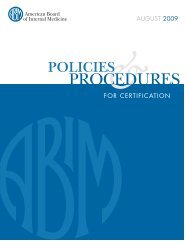The SRA Symposium - College of Medicine
The SRA Symposium - College of Medicine
The SRA Symposium - College of Medicine
You also want an ePaper? Increase the reach of your titles
YUMPU automatically turns print PDFs into web optimized ePapers that Google loves.
Many specialties struggle with the perception <strong>of</strong> their lack <strong>of</strong> pr<strong>of</strong>essionalism-from public administration<br />
through engineering. Public administration continues to discuss different concepts<br />
concerning its pr<strong>of</strong>essional status (Spicer). Troen and Boles indicate that the teacher crisis is due to<br />
the lack <strong>of</strong> a career ladder, thereby preventing it from being considered “a real pr<strong>of</strong>ession, similar<br />
to medicine and law.” S<strong>of</strong>tware engineers struggle with the concept <strong>of</strong> developing a certification<br />
or licensure similar to other engineering disciplines and are addressing the need for continuing<br />
education and certification <strong>of</strong> various grades <strong>of</strong> practitioners as found in the essays <strong>of</strong> Griss,<br />
Gotterbarn, and Shaw.<br />
<strong>The</strong>se views may differ but the underlying precepts are the same. A pr<strong>of</strong>ession requires dedication,<br />
education, involvement, ethics, and standards. <strong>The</strong> public demands accountability after unfortunate<br />
or isolated instances <strong>of</strong> unethical behavior occur (ACSM). <strong>The</strong>se incidents or pressures from<br />
increasing risk usually force associations to focus their efforts on becoming a recognized pr<strong>of</strong>ession,<br />
which when achieved, provides confidence in the behavior <strong>of</strong> its members.<br />
<strong>The</strong> Population <strong>of</strong> the Pr<strong>of</strong>ession<br />
Papers<br />
Pr<strong>of</strong>essional Organizations<br />
Research administration requires knowledge from many disciplines as emphasized by the variety<br />
<strong>of</strong> pr<strong>of</strong>essional organizations available to promote continuing education (Appendix 1). <strong>The</strong> two<br />
main associations for research administrators provide continuing education for more than 10,000<br />
pr<strong>of</strong>essionals through the utilization <strong>of</strong> list-servs, workshops, lectures, conferences, and networking<br />
to provide them the knowledge <strong>of</strong> regulations and techniques for decision-making.<br />
Body <strong>of</strong> Knowledge<br />
Members <strong>of</strong> NCURA and <strong>SRA</strong> developed the topical outline to assist institutions and pr<strong>of</strong>essionals<br />
in developing the expertise necessary to support their research (Appendix 2). <strong>The</strong> Research<br />
Administrators Certification Council (RACC) utilizes the body <strong>of</strong> knowledge to prepare its certification<br />
examination. <strong>The</strong> topics <strong>of</strong> which a certified research administrator needs to have a sound<br />
understanding are: identification <strong>of</strong> funding opportunities, proposal development, budget preparation,<br />
administration <strong>of</strong> awards, ethics and pr<strong>of</strong>essionalism, conflict <strong>of</strong> interest, bioethics, human<br />
subjects, animal care, responsible conduct in research, intellectual property, governing regulations,<br />
accounting, auditing, facilities management, contracting, procurement, records management, and<br />
human resource management.<br />
Code <strong>of</strong> Ethics<br />
An example <strong>of</strong> a research administrator’s code <strong>of</strong> ethics as found in <strong>SRA</strong>’s policy and procedure<br />
manual is:<br />
<strong>The</strong> Society <strong>of</strong> Research Administrators exists to improve the efficiency and effectiveness<br />
<strong>of</strong> the administration <strong>of</strong> research and sponsored programs. This improvement<br />
is accomplished, in part, through the development and promotion <strong>of</strong> pr<strong>of</strong>essional<br />
standards. Accordingly, every member <strong>of</strong> the Society shall be governed by<br />
the following code <strong>of</strong> ethics.<br />
As a research administrator, I will: 1) Maintain the highest level <strong>of</strong> pr<strong>of</strong>essional<br />
and personal conduct to enhance our organization and pr<strong>of</strong>ession in order to gain<br />
the trust and respect <strong>of</strong> our peers, employer, researchers, research funding agencies,<br />
and the public at large. 2) Accept responsibility to enhance my pr<strong>of</strong>essional<br />
competence and freely share my pr<strong>of</strong>essional knowledge with others. Follow the<br />
letter and the spirit <strong>of</strong> the laws, regulations, and sponsorship agreement affecting<br />
research administration responsibilities. 3) Inform individuals who are associ-<br />
2005 <strong>Symposium</strong> Proceedings Book 97

















